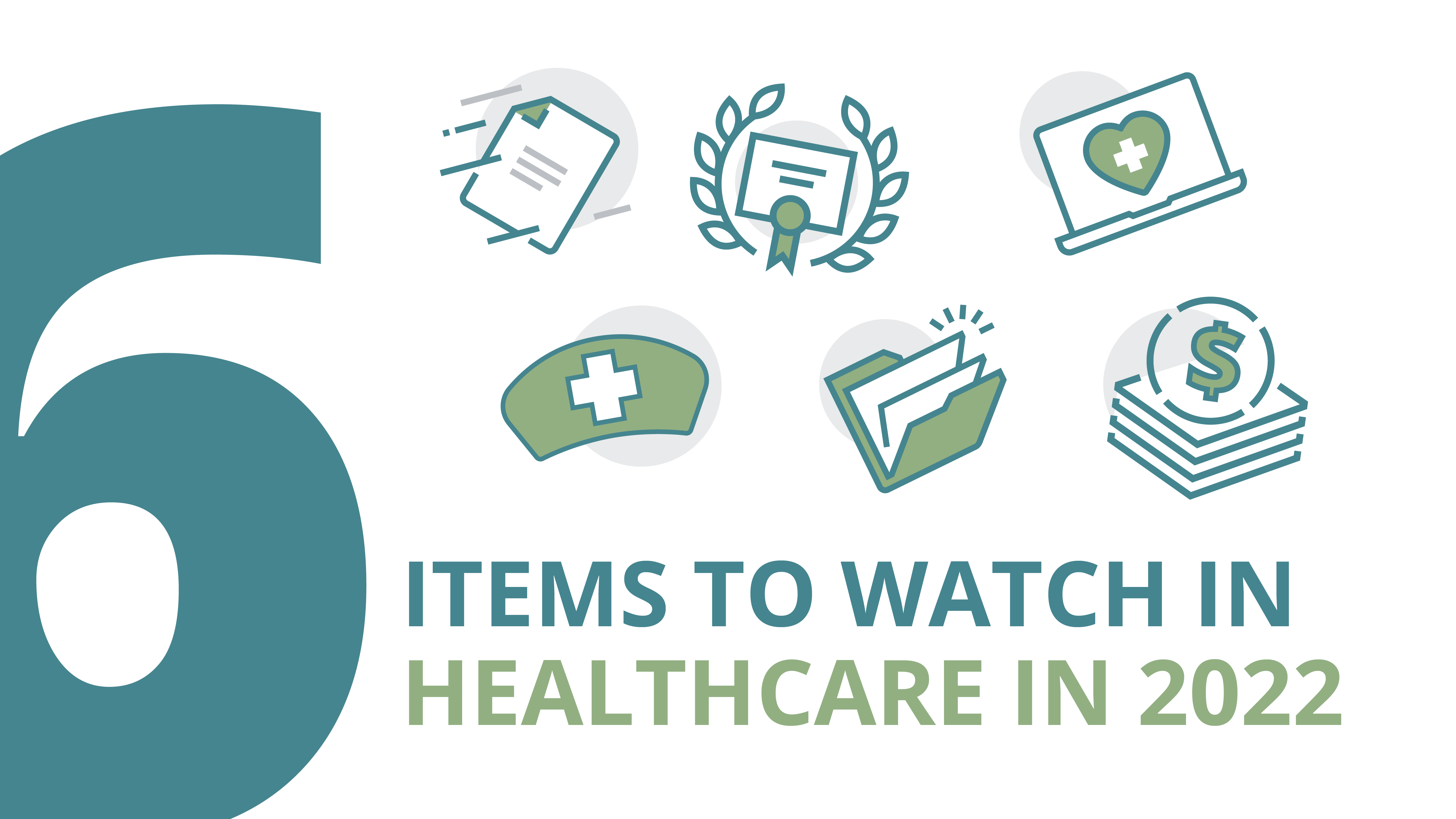What your healthcare organization can expect in 2022

As we prepare to close out 2021, 2022 already looks to be an eventful year for the healthcare industry.
To help get a head start on the new year, Med Law Advisory Partners has identified six issues we expect to loom large on our clients’ radar. We’ve assembled this list from key developments in healthcare law in 2021 and from upcoming reports expected in 2022 from the Department of Health and Human Services’ Office of Inspector General.
Here are six things your organization can expect from the healthcare industry and in healthcare law in 2022.

1. An increase in medical malpractice litigation
The healthcare industry is bracing itself for an increase in medical malpractice lawsuits, a trend which can be seen in the further hardening medical malpractice insurance market.
According to Risk & Insurance, the industry is not only anticipating an increase in claims associated with the spread, diagnosis and treatment of COVID-19, it’s also anticipating a rise in claims tied to the availability of health care and health care resources during the pandemic. Medical professional liability carriers are particularly concerned about a wave of new litigation as statutes of limitation approach in the next two years.
A wave of new claims will continue to require hospitals and aging-services providers to do more with already-limited risk management, legal and quality-assurance budgets. Such organizations should consider how Med Law can partner with them to expand their capacity to respond, whether in terms of investigating claims or reviewing records for active litigation.
 2. Uncertainty surrounding liability for claims under the PREP Act
2. Uncertainty surrounding liability for claims under the PREP Act
In addition to anticipating more litigation, healthcare organizations, especially long-term care providers, are keeping a close eye on how federal courts interpret healthcare provider immunity as set out by the federal Public Readiness and Emergency Preparedness Act, or PREP Act.
In March 2020, then-HHS Secretary Alex Azar invoked the PREP Act after declaring COVID-19 a public health emergency. The PREP Act authorizes the HHS secretary to limit legal liability for losses relating to the administration of medical countermeasures such as diagnostics, treatments and vaccines.
Across the country, the estates of people who have died of COVID-19 while under the care of nursing homes have filed wrongful death suits against the facilities in state courts, and nursing homes have responded by removing them to federal court. Nursing homes have argued in court that the PREP Act preempts state-law claims entirely.
While several lower-level federal courts have ruled on the issue – mostly in favor of plaintiffs – as of early December, only one federal appeals court has weighed in. In October, in Estate of Maglioli v. Alliance HC Holdings, the U.S. Court of Appeals for the Third Circuit declined to find that the PREP Act fully preempted the plaintiffs’ state-law negligence claims. The court found that while federal courts have jurisdiction over claims of “willful misconduct” as outlined in the PREP Act, the plaintiffs’ claims were not similar enough to allow the case to proceed in federal court. The case will continue instead in New Jersey state court.
Similar cases are proceeding in other federal appellate circuits and are sure to make new law in 2022. Med Law is keeping a close eye on developments in this arena; follow us on LinkedIn for updates on this issue.
 3. Increased HHS scrutiny of telehealth services
3. Increased HHS scrutiny of telehealth services
Early in the COVID-19 pandemic in 2020, the Centers for Medicare & Medicaid Services, or CMS, issued temporary policy changes making it easier for Medicare and Medicaid patients to receive care through telehealth services when in-person care was limited. This year, HHS’s Office of Inspector General announced investigations as part of its Work Plan that touch on telehealth services, with reports expected in 2022.
One is a telehealth-related audit of Medicare Part B Services. The audit includes two phases. The first phase focuses on whether services such as evaluation and management, opioid-use disorder, end-stage renal disease and psychotherapy meet Medicare requirements, while the second phase focuses on a broader range of Medicare Part B telehealth services.
HHS also announced that it planned to audit home health services provided as telehealth during the COVID-19 public health emergency. The office is evaluating home health services provided by agencies to determine which types of skilled services were furnished via telehealth and whether those services were administered and billed according to Medicare requirements. OIG said it would report any improperly billed services as overpayments and make recommendations to CMS based on the results of the audit.
 4. The results of an HHS study of how the pandemic affected nursing homes
4. The results of an HHS study of how the pandemic affected nursing homes
Few healthcare settings have experienced the depth of loss during the pandemic as have American nursing homes and long-term care facilities. Because residents of these facilities are most likely to be elderly, have pre-existing health conditions and live in communal settings, they’ve been especially vulnerable to the pandemic.
With those conditions in mind, in April 2021, HHS announced a three-part study of how the pandemic affected nursing homes. In the first phase of the study, which has been completed, HHS analyzed the extent to which Medicare beneficiaries in nursing homes were diagnosed with COVID-19 and described the characteristics of patients at greater risk.
In the second phase, the study’s goal is to describe the characteristics of nursing homes hit hardest by the pandemic, and, in the third phase, the office intends to describe strategies nursing homes used to mitigate challenges. HHS is expected to issue the remaining portions of the audit report in 2022.
 5. The release of opioid-use disorder treatment service data
5. The release of opioid-use disorder treatment service data
In the background of the COVID-19 pandemic, another public health threat has loomed large: the opioid epidemic. According to CDC data released in November, an estimated more than 100,000 Americans died of drug overdose deaths in the year ending in April 2021.
As a result, HHS has focused some of its investigative efforts on both the prescription of opioids and treatment of opioid-use disorder. In addition to updating its early-2020 opioid data in 2021, in August, HHS announced plans to audit Medicare Part B opioid-use disorder treatment services provided by opioid treatment programs to determine whether the services were allowable in accordance with Medicare requirements.
 6. The results of Medicare payment audits
6. The results of Medicare payment audits
Going into 2022, healthcare organizations can expect a continued interest from the HHS OIG in rooting out Medicare fraud.
In 2021, HHS said it will audit whether Medicare appropriately paid claims under Medicare Part B for physician services based on correct place-of-service code when a beneficiary was an in-patient at a skilled nursing facility or hospital. This audit was prompted by preliminary 2018 and 2019 data that showed that Medicare may have paid a significant number of claims at a higher nonfacility rate when the beneficiary was a Part A inpatient at a hospital or skilled nursing facility.
It also announced plans to audit Medicare emergency department evaluation and management services to ensure Medicare payments to providers for such services were appropriate, medically necessary, and paid in accordance with Medicare requirements.
Both reports are anticipated for release in 2022.
In November, HHS also announced plans to review Medicare payments for inpatient claims involving mechanical ventilation and Medicaid inpatient claims involving severe malnutrition. The reports are scheduled for release in 2023.
How we can help
Whether your healthcare organization is facing a medical malpractice claim or investigation, the team at Med Law is here to assist by helping expand your internal capacity to handle claims. Med Law has a breadth of knowledge stemming from the vast and varied clinical experience of our team. As medical consultants, our highly-skilled clinicians work with both health care systems and legal teams to ensure positive outcomes in medical-legal matters. Contact us for more on how our team can assist yours.